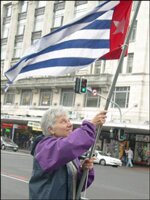06 June 2009
West Papuan clergyman to speak on human rights at seminar
14 June 2006
By Dianna Vezich: Te Waha Nui Online
West Papua is a territory right on New Zealand’s back doorstep that has been termed the “forgotten Pacific country” and it will soon be highlighted by a recently harassed Papuan clergyman at a two-day seminar at AUT University.
 |
|
“It is very much an oppressive situation in West Papua, and the Indonesian military have a heavy presence,” says Marie Leadbeater, spokesperson of the Indonesian Human Rights Committee.
Neighbour to Papua New Guinea, West Papua has been under Indonesian rule since 1963.
Leadbeater is concerned that many New Zealanders don’t really understand much about West Papua, or the human rights abuses that occur in the territory on a regular basis.
The IHRC, ecumenical groups and academics are running a seminar about the “hidden conflict” in West Papua at AUT’s conference centre on August 18-19.
Papuan Baptist leader Reverend Socratez Sofyan Yoman will be a key speaker at the seminar.
He is one of many West Papuans who have been threatened by the military and police intelligence officers.
Last month Reverend Yoman had his passport seized while on his way to Australia.
While he did get his passport back, the belongings inside his suitcase were thoroughly searched.
“Brothers and sisters, if a church leader like myself was intimidated and terrorised, then that means that the security and the safety of the Papuans are in danger,” he says.
“This gives a real picture that the life and the freedom of the native Papuans is threatened and in danger.”
The TNI/POLRI is the Indonesian armed forces and police who rule West Papua.
Leadbeater accuses them of “horrific abuses” in the province.
The West Papuan website has been dedicated to promoting self-determination and independence for all West Papuans.
It lists many killings and massacres reported in West Papua since the late 1960s.
As well as violence and intimidation, the people of West Papua are also the target of environmental abuses.
Large international corporations are involved in illegal logging of West Papua’s virgin rainforest, as well as the exploitation of the largest gold mine in the world in West Papua’s central mountains, Irian Jaya.
The mine is run by the New Orleans-based company Freeport McMoRan.
Leadbeater claims the company has caused a lot of environmental devastation, with a lot of waste rock tailings finding their way into rivers.
“The profits of the mine go off-shore to the owners of Freeport McMoRan, and some of the deaths this year were caused because of protests about the mine,” she says.
Recently Rachel Harvey, a BBC journalist was given rare permission to enter West Papua and report on how West Papuans felt about Indonesian rule.
In one of her BBC dispatches she says: “I didn’t talk politics with every Papuan I met. But whenever the subject came up, and it did repeatedly, everybody I spoke to told me they wanted independence.”
Dr Heather Devere, senior lecturer in political science at AUT is also on the organising committee for the conference.
“The IHRC is concerned about the situation in West Papua and the lack of knowledge about it among New Zealanders,” she says.
She is encouraging her students to participate in the conference as part of their Conflict Resolutionpaper.
Dr Devere believes the situation in West Papua is similar to what happened in East Timor, who were also previously ruled by Indonesians.
“We’ve had a lot of involvement in East Timor. We should at least know what’s happening in West Papua.”
“If we don’t deal with a conflict like this early on, we’re breeding a generation of particularly young who will develop a culture where the only perceived way of getting out of conflict is physical violence,” she says.
Links:
- BBC’s Rachel Harvey reports on Indonesian human rights abuses
- West Papua seminar news website
- West Papua website




